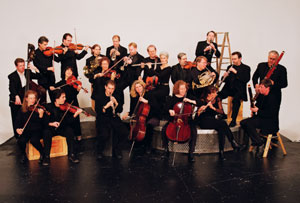|
HOME | SEARCH | ARCHIVE |
|
Conductorless orchestra shows MBA students how to inspire workers
Applying the “Orpheus Process” to the business world
![]()
By Diane Ainsworth, Public Affairs
| |  The conductorless Orpheus Chamber Orchestra has garnered international attention in the corporate sector for its use of teamwork and motivational management principles. The New York-based group offers a day-long residency for Haas MBA students this week. Orpheus Orchestra photo |
29 November 2001
|
Haas School of Business graduate students are getting a rare opportunity this week to learn some of the principles of teamwork and motivational management in a day-long residency by the “conductorless” Grammy Award-winning Orpheus Chamber Orchestra. As the only chamber orchestra in the world that consistently rehearses, performs and records without a conductor, the orchestra demonstrates the “Orpheus Proc-ess” in action for Haas MBA students during its Nov. 29 rehearsal and performance of the first movement of Haydn’s Symphony No. 63 in C Major. “Most businesses today are trying to inspire people and generate commitment, rather than just compliance, and that means you need a lot of engagement and involvement,” said one of the performance coordinators, Terry Pearce, a Haas School lecturer and leadership communications adviser at Charles Schwab, Inc. in San Francisco. “In a conductorless orchestra, the musicians have to make the decisions and agree on how they will play each part of a score,” he said. “That requires team emotional intelligence. The orchestra members have to relate to each other in a very mature way to get results, and everyone has to participate.” Orpheus has garnered worldwide attention in the corporate sector for its unique approaches to creativity, innovation and self-management. The “Orpheus Process” is built on individual responsibility, shared leadership and workplace democracy, principles that are highly valued in today’s progressive corporate environment, Pearce said. These principles have enabled the orchestra to unleash the talent, vision, creativity and leadership potential of each member of the group, and brought the group international acclaim over the last 28 years. Applications of the “Orpheus Process” will be introduced at the beginning of the residency and reinforced through a question-and-answer session later with the student audience and presenters. Central to the distinctive personality of Orpheus is its unusual process of sharing and rotating leadership roles. For every musical work, an elected committee of musicians selects a concertmaster and each instrumental section chooses a representative. These chosen representatives, called the “core group,” are responsible for forming the initial concept of the piece and developing an overall interpretive approach to the music, such as establishing the tempo, phrasing, articulation and dynamics, before the entire orchestra comes together to rehearse. “The audience will get to see the rehearsal and decision making live, and that’s really unique,” said Pearce. “This is not staged, but real. It’s the decision-making process that is so interesting and what we can learn from. Most people never see that process unless they are sitting in the board room when the meeting is going on.” The conductorless performance, held at the International House Auditorium, is sponsored by Morgan Stanley, a global financial services firm. Presenters include Haas School Dean Laura D’Andrea Tyson; Harvey Seifter, executive director of Orpheus Chamber Orchestra and author of “Leadership Ensemble”; Haas lecturer Terry Pearce; and David Pottruck, co-chief executive officer of Charles Schwab.
Home | Search | Archive | About | Contact | More News
Copyright 2000, The Regents of the University of California.
Produced and maintained by the Office of Public Affairs at UC Berkeley.
Comments? E-mail berkeleyan@pa.urel.berkeley.edu.